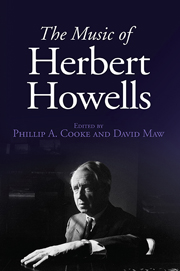Book contents
- Frontmatter
- Dedication
- Contents
- List of Illustrations
- List of Musical Examples
- List of Tables
- List of Contributors
- Foreword
- Acknowledgements
- Miscellaneous Frontmatter
- Introduction: Paradox of an Establishment Composer
- PART I Howells the Stylist
- PART II Howells the Vocal Composer
- PART III Howells the Instrumental Composer
- PART IV Howells the Modern
- PART V Howells in Mourning
- Appendix: Catalogue of the Works of Herbert Howells
- Bibliography
- Index of Works
- General Index
Foreword
Published online by Cambridge University Press: 05 December 2013
- Frontmatter
- Dedication
- Contents
- List of Illustrations
- List of Musical Examples
- List of Tables
- List of Contributors
- Foreword
- Acknowledgements
- Miscellaneous Frontmatter
- Introduction: Paradox of an Establishment Composer
- PART I Howells the Stylist
- PART II Howells the Vocal Composer
- PART III Howells the Instrumental Composer
- PART IV Howells the Modern
- PART V Howells in Mourning
- Appendix: Catalogue of the Works of Herbert Howells
- Bibliography
- Index of Works
- General Index
Summary
I remember him so clearly: a sweet, silvery-haired gentleman, scarcely over five feet tall, still strikingly handsome in his eighties and always immaculately debonair in his attire, though you sensed that the beautifully cut suits had been made many years before and were carefully looked after. His speech was an elegant, expressive Oxford drawl; no trace remained of the west-country burr he must have had as a child. When a woman was present, his face would light up with a smile that had made many feminine hearts melt, and somehow his troubling deafness would disappear. He had charm, a now unfashionable quality, but it was so intrinsic to his personality that you never felt it was being switched on for effect.
I met him now and again in the 1970s, sometimes at the Royal College of Music, once at his home in Barnes, and memorably in Cambridge, a place of happy memories for him ever since his wartime stint as organist at St John's College – this had sparked off his second career as the composer who, more than any other, gave the Anglican Church its musical voice in the second half of the twentieth century. He loved to tell stories; in an earlier life perhaps he had been a Celtic bard, a weaver of dreams. Many of us heard his tales of a long-ago lunch with Ravel and Stravinsky, his encounter with Elgar, his excitement at the 1910 premiere of the Vaughan Williams Tallis Fantasia… but his meeting with ‘dear George’ (he was referring to Gershwin) in America? Perhaps that one was just a dream.
- Type
- Chapter
- Information
- The Music of Herbert Howells , pp. xviiiPublisher: Boydell & BrewerPrint publication year: 2013

